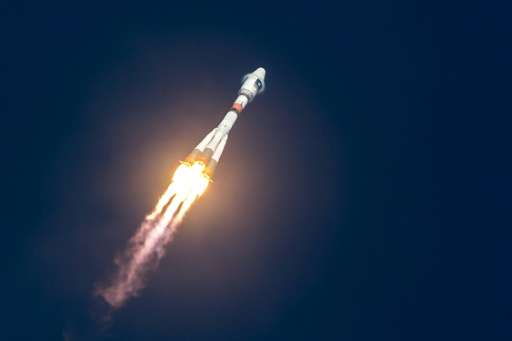Europe launches fresh satellite pair for sat-nav system

Europe's Galileo sat-nav system, a rival to America's GPS, took a step closer to becoming operational Tuesday with the launch of a fresh pair of satellites to join a dozen already in space.
Orbiters 13 and 14 blasted off on a Russian Soyuz rocket from Europe's spaceport in Kourou, French Guiana, at 0848 GMT as planned, according to space agencies.
After a journey of nearly four hours, the 700-kilogramme (1,540-pound) satellites entered Earth orbit at an altitude of 23,522 kilometres (14,615 miles).
"Named for the astronomer who pinpointed the Earth's true position in the Solar System, the Galileo satellite navigation system that will help Europe find its way in the 21st century now has 14 satellites in orbit," the European Space Agency (ESA) said.
Seventeenth century Italian astronomer Galileo Galilei was tried for heresy and jailed by the Catholic Church for insisting the Earth orbited the Sun.
Ultimately, the multi-billion-euro constellation named after the "father of modern science" is meant to comprise 30-odd satellites—the final number is yet to be determined—providing navigation and search-and-rescue services.
"This morning's launch... marks a further step towards European independence in satellite navigation," said Stephane Israel, chairman of launch firm Arianespace.
Another launch, this time of four orbiters on a single rocket, is expected to boost the constellation to 18 by year-end, allowing for Galileo to start providing usable signals.
Israel told AFP the target launch date was November 17.
More modern than the US Global Positioning System (GPS), Galileo's high-tech instruments should allow it to provide a more precise signal, its developers say.
But the project has been plagued by delays, technical glitches and budgetary difficulties.
The launch of the seventh and eighth orbiters in March last year was about three months late to allow engineers time to probe an August 2014 mishap which sent satellites five and six into a lopsided orbit.
That incident was blamed on frozen fuel pipes on the Soyuz rocket's fourth stage, called Fregat—a problem the ESA says has since been fixed.
The first four, so-called In-Orbit Validation (IOV) satellites, were hoisted in 2011 and 2012.
In March 2013, the quartet managed to pinpoint their first-ever ground location with an accuracy of between 10-15 metres (32 to 49 feet).
Catching up
However, the launch of satellites five and six—meant to have been the first fully operational Galileo constituents—was delayed by more than a year due to "technical difficulties".
This was followed by the mislaunch of orbiters seven and eight, which ESA says have since been nudged closer to their intended orbit, although their ultimate usefulness to the constellation has yet to be determined.
Another satellite dubbed IOV4, among the first four launched, has developed antenna problems, according to ESA, but is still able to transmit on one frequency.
The space agency had initially hoped for early navigation services to be available from 2014.
Tuesday's "textbook" launch, the seventh for Galileo, was a late addition to the schedule in a bid to speed up deployment of the project funded by the European Commission, the European Union's executive body.
"Today's launch brings Europe's Galileo constellation halfway to completion," said Paul Verhoef, ESA Galileo director.
The commission had budgeted some seven billion euros ($7.8 billion) for Galileo until 2020.
"It is time we view Galileo in a positive light; it has been a fantastic success even if there were some stumbling blocks along the way," insisted Israel.
The next 12 satellites will be launched with Europe's own Ariane 5 ES launcher, especially adapted to handle four at a time.
© 2016 AFP




















